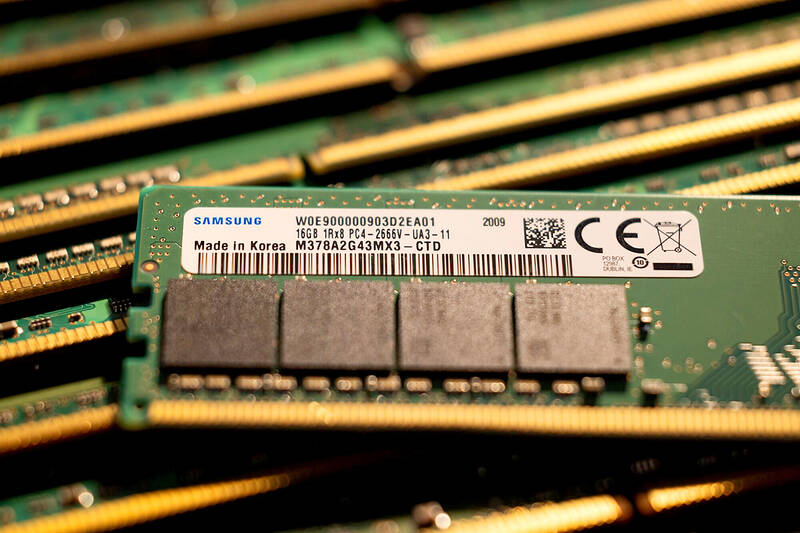DRAM chipmakers Nanya Technology Corp (南亞科技) and Winbond Electronics Corp (華邦電子) saw shares rally more than 4 percent yesterday after DDR4 DRAM prices surged about 6 percent on average amid reducing supply.
Supply of DDR4 and low-power DDR4 DRAM chips has been dwindling as major global players such as SK Hynix Inc have been shifting to high-bandwidth memory (HBM) chips or advanced DDR5 DRAM chips in response to the artificial intelligence (AI) boom, with an aim of phasing out of DDR4 DRAM market.
Nanya primarily produces DDR4 DRAM chips currently.

Photo: Bloomberg
TrendForce Corp’s (集邦科技) data showed prices of DDR4 DRAM chips climbed 5.21 percent to 8.11 percent on the spot market in the afternoon of yesterday, with high-density DDR4 16GB climbed 4.76 percent to US$7.355 per unit, even surpassing new-generation DDR5 16GB’s US$5.901 per unit.
Due to the price spike, Nanya and Winbond yesterday temporarily halted trading of DDR4 chips, even though they sell most of their DRAM chips on a contract basis, TrendForce said.
Nanya in April said it expected a price uptick in DDR4 DRAM chips from this quarter on the back of production cuts from major players and the effect of China’s stimulus packages, which have boosted electronics sales and chip demand, it added.
As the third quarter is usually a high season for chip companies, Nanya in April said it expects further improvement in demand and chip prices.
The company said it aims to produce high-density DDR5 DRAM chips after fully upgrading its manufacutring technology to 10-nanometer-class process technology later this year from 20-nanometer technology.
It also plans to provide customized HBM chips for AI-enabled edge devices such as AI PCs and AI smartphones by the end of next year.
Nanya shares soared 9.85 percent to close at NT$59.1, while Winbond jumped 4.8 percent to NT$19.65. They have surged 29 percent and 16.27 percent respectively since the beginning of this month.

Macronix International Co (旺宏), the world’s biggest NOR flash memory supplier, yesterday said it would spend NT$22 billion (US$699.1 million) on capacity expansion this year to increase its production of mid-to-low-density memory chips as the world’s major memorychip suppliers are phasing out the market. The company said its planned capital expenditures are about 11 times higher than the NT$1.8 billion it spent on new facilities and equipment last year. A majority of this year’s outlay would be allocated to step up capacity of multi-level cell (MLC) NAND flash memory chips, which are used in embedded multimedia cards (eMMC), a managed

CULPRITS: Factors that affected the slip included falling global crude oil prices, wait-and-see consumer attitudes due to US tariffs and a different Lunar New Year holiday schedule Taiwan’s retail sales ended a nine-year growth streak last year, slipping 0.2 percent from a year earlier as uncertainty over US tariff policies affected demand for durable goods, data released on Friday by the Ministry of Economic Affairs showed. Last year’s retail sales totaled NT$4.84 trillion (US$153.27 billion), down about NT$9.5 billion, or 0.2 percent, from 2024. Despite the decline, the figure was still the second-highest annual sales total on record. Ministry statistics department deputy head Chen Yu-fang (陳玉芳) said sales of cars, motorcycles and related products, which accounted for 17.4 percent of total retail rales last year, fell NT$68.1 billion, or

In the wake of strong global demand for AI applications, Taiwan’s export-oriented economy accelerated with the composite index of economic indicators flashing the first “red” light in December for one year, indicating the economy is in booming mode, the National Development Council (NDC) said yesterday. Moreover, the index of leading indicators, which gauges the potential state of the economy over the next six months, also moved higher in December amid growing optimism over the outlook, the NDC said. In December, the index of economic indicators rose one point from a month earlier to 38, at the lower end of the “red” light.

MediaTek Inc (聯發科) shares yesterday notched their best two-day rally on record, as investors flock to the Taiwanese chip designer on excitement over its tie-up with Google. The Taipei-listed stock jumped 8.59 percent, capping a two-session surge of 19 percent and closing at a fresh all-time high of NT$1,770. That extended a two-month rally on growing awareness of MediaTek’s work on Google’s tensor processing units (TPUs), which are chips used in artificial intelligence (AI) applications. It also highlights how fund managers faced with single-stock limits on their holding of market titan Taiwan Semiconductor Manufacturing Co (TSMC, 台積電) are diversifying into other AI-related firms.